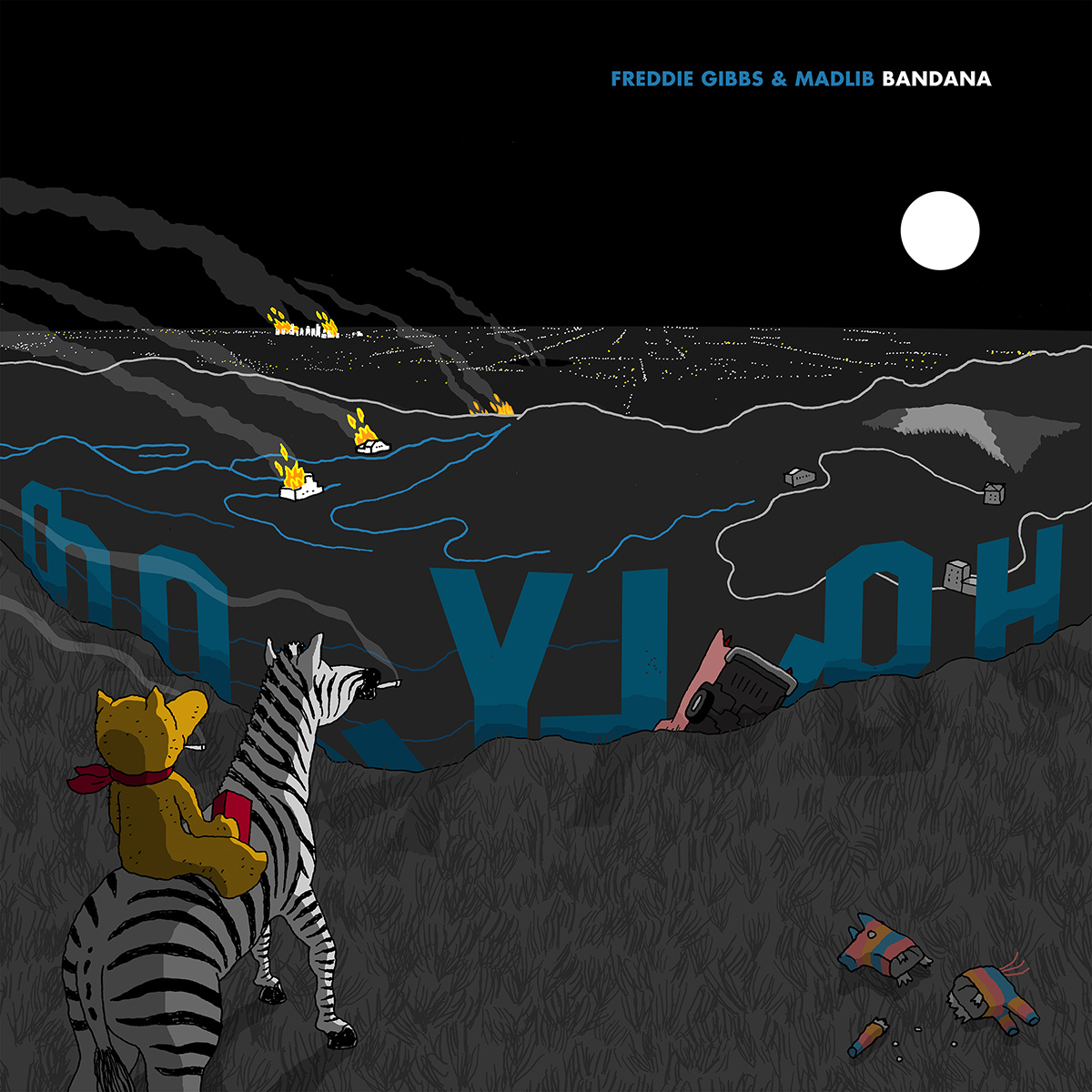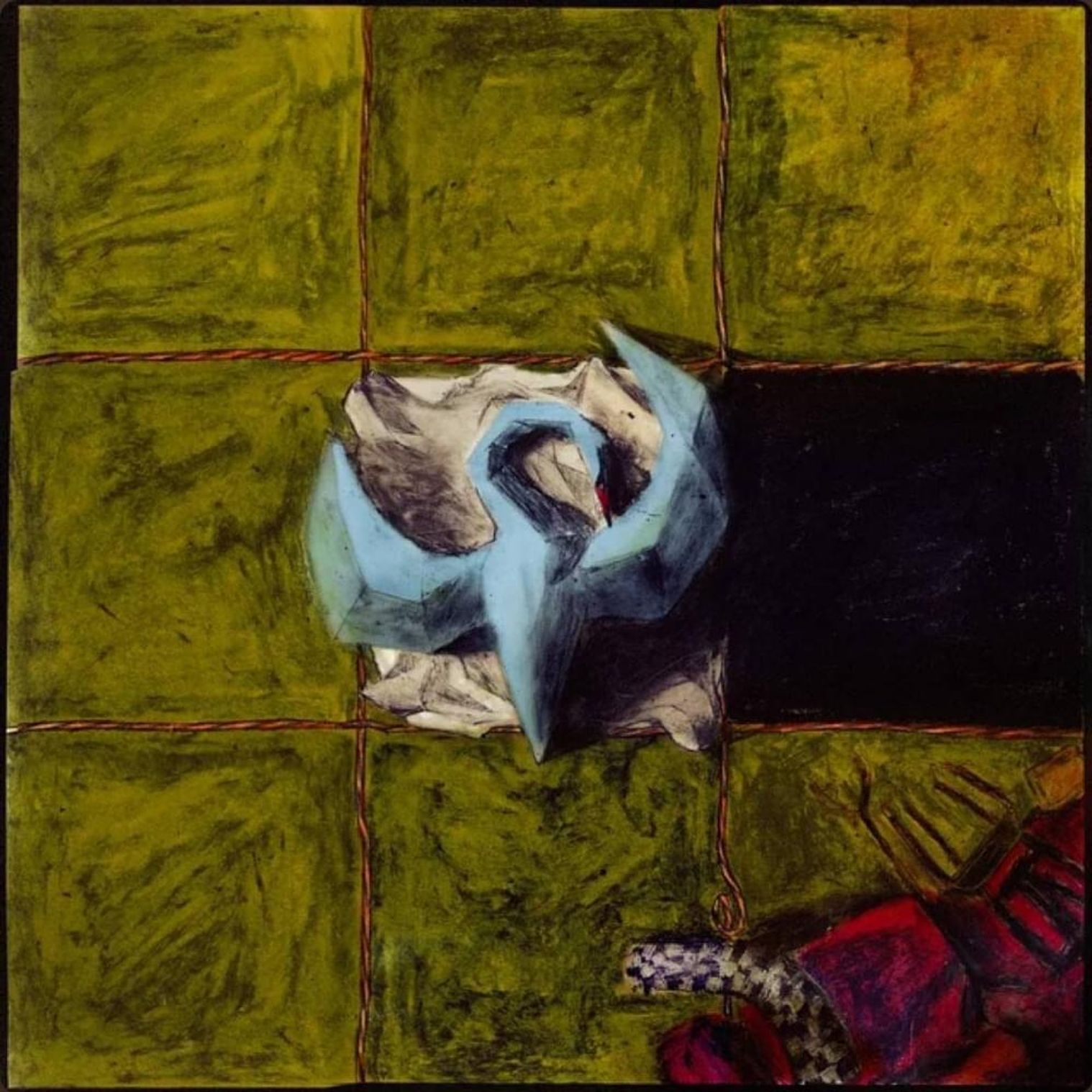The combination of Freddie Gibbs and Madlib makes no sense, which is why it makes the most sense. Gibbs comes from the burned-out and forgotten city of Gary, Indiana, and he makes snarling, unpretentious, head-down gangsta rap music. He talks about growing up amidst violence and poverty with a rare gravity, and he brings granular detail and clear bloodthirsty delight to his drug-trade stories. As a pure technical rapper, he's breathtaking. He understands the concept of flow like few others. He knows how to rattle off syllables with astonishing speed while staying in the beat's pocket and maintaining a calm, conversational presence. But Gibbs isn't an experimenter.
Instead, Freddie Gibbs is an unflashy artisan, and he'd probably be happy rapping over 808 thuds and G-funk synth-whines for the rest of his career. Once upon a time, that might've made him a star, or at least a cult favorite capable of moving vast quantities of CDs to a devoted audience. But in the '00s, when he signed his first misbegotten Interscope deal, that approach was no longer a populist one, and Gibbs was adrift. So he got himself dropped and learned to exist on the internet, where he found an audience that loved that throwback gutter-talk shit.
Madlib, by contrast, has always been an experimenter. When he first started, as a member of the '90s Oxnard rap crew Lootpack, he was a loose affiliate of the Likwit Crew, a group of workmanlike Californian rap head-slappers. The bigger Likwit Crew names -- King Tee, tha Alkaholiks, Xzibit -- were the same sort of populist-underground tough-talkers that Freddie Gibbs would become. But Madlib was on a different trip. Madlib came from a family of jazz musicians, and he made records that progressively drifted further and further into the astral abstract. He found like-minded collaborators -- J Dilla, MF DOOM -- and perfected his own broken, splintered, sample-driven form of rap psychedelia. Madlib never threatened to become a star, the way Gibbs did. Instead, he was always happy making woozy headphone music. He and Gibbs are strange partners, but together, they work.
Five years ago, Gibbs and Madlib made Piñata, a happy experiment of a record. They both had to extend themselves out of their comfort zones. Madlib had to make relatively linear beats, beats that would give Gibbs' snarl room to resonate. And Gibbs had to change his approach, to realize he was making inward-excursion music rather than street anthems. Together, they pulled it off. Members of rap's smart-kid cognoscenti -- Mac Miller, Earl Sweatshirt, Danny Brown -- showed up and made contributions. So did legends like Raekwon and Scarface. The result is a quiet miracle, a record that sticks with you. After that, Gibbs and Madlib both went on their ways, making good records that didn't quite stack up to what they'd done together. And they had time to think about Piñata, to consider how well their strange combination had worked. There was always going to be another one. There had to be.
Bandana, the long-awaited Piñata follow-up, is everything that anyone could've hoped. It's a deeper record than Piñata -- stranger, headier, more inward. Gibbs wrote most of his lyrics in an Austrian jail, while he waited for trail on sexual assault charges. (Gibbs maintains that the charges were based on a false accusation, and he was acquitted of all charges.) So many of his lyrics are meditative and insular -- a man who's led a chaotic life taking stock of where it's taken him. Some of his lyrics are based in historical trauma: "Crackers came to Africa, ravaged, raffled, and rummaged me / America was the name of they fucking company." Sometimes, they're about dehumanization: "Diamonds in my chain, yeah, I slang but I’m still a slave / Twisted in the system, just a number listed on the page." Sometimes, they're about specific interpersonal stuff: "She tried to make me go to counseling, but that ain’t change shit."
Meanwhile, Madlib's music gurgles and sputters and drifts. The beats on Bandana slap hard, but they slap in strange and oblique ways. "Flat Tummy Tea" welds distorted acid-rock guitars to Middle Eastern flutes and off-kilter drum cracks. "Massage Seats" drowns a mournful vocal sample in a noisy morass of smothered drum sounds. "Practice" is ghostly and meditative, a gospel hymn folded in on itself. Madlib will drown tracks in static, or he'll interrupt himself by abruptly switching from one beat to the next mid-bar. It's almost like he's testing Gibbs, just seeing how fluidly he can adapt to another unforgiving sonic environment. Gibbs is always right there with him, catching those changes and immediately locking in. It's practically a circus act. You just can't throw this guy off.
Gibbs has talked about how rapping on Madlib beats isn't easy, how the track can overwhelm the vocals. And Gibbs' voice isn't mixed nearly as high on Madlib tracks as it is on most of his records. But once you lock into what Gibbs is saying -- something that can take a few listens -- you find out that he's as instinctive and unflinching a writer as ever. There is a beautiful economy to a Gibbs punchline: "Murder note go to the motherfucking plaintiff at my arraignment / Keep the dead oppressors on green paper / Fuck being famous," "Keep a baby .380 with me like Khaled stay with Asahd / Bump that poison poppy seed, the Afghani shit from the mob." And he plays around with vowel sounds in ways that few can approach: "Scary Gary nigga, my neighborhood something like Fallujah / Vladimir banana clip moving, Russian collusion shooters." His crime-life talk is familiar but convincing, and he finds the life in it. Cliches never sound like cliches when Gibbs delivers them with artful inventiveness. He just knows what he's doing.
There are a few guests on Bandana, but it never becomes the free-for-all that Piñata sometimes was. Most of the guests are finely-aged legends with craggy voices that mach up nicely with what Gibbs does: Pusha T, Black Thought, Killer Mike, Yasiin Bey. (It is so good to hear the former Mos Def rapping his ass off again.) Anderson .Paak shows up on "Giannis" and actually sings a hook, a rarity on a Madlib/Gibbs record. Most of the time, though, this is two guys who know each other well, pushing each other and pushing themselves. It works the same as a great jazz session -- these two vastly different artists figuring out how to get into each other's groove.
Bandana is out 6/28 on Keep Cool/RCA.
Other albums of note out this week:
• The Black Keys' riffed-up return "Let's Rock".
• Horse Jumper Of Love's vivid slowcore LP So Divine.
• Summer Cannibals' nervy, wiry indie rocker Can’t Tell Me No.
• Prince Daddy & The Hyena's hooky, riff-happy power-popper Cosmic Thrill Seekers.
• Mustard's rap collab collection Perfect 10.
• Mega Bog's sci-fi pop trip Dolphine.
• Mountain Man offshoot Daughter Of Swords' debut Dawnbreaker.
• Sofia Bolt's baroque, lilting indie rocker Waves.
• Yellow Eyes' warped black metal kaleidoscope Rare Field Ceiling.
• Outer Spaces' tangled slow burner Gazing Globe.
• Spirits Having Fun's giddy, playful debut Auto-Portrait.
• The Appleseed Cast's emo meditation The Fleeting Light Of Impermanence.
• Brijean's Walkie Talkie EP.
• Giant In The Lighthouse's Waving EP.






